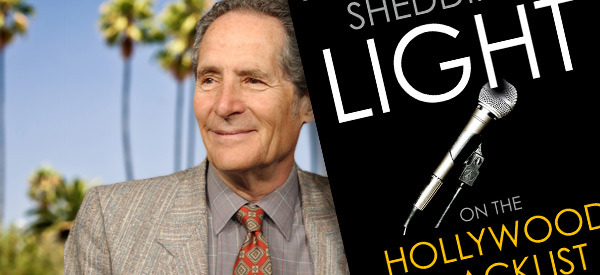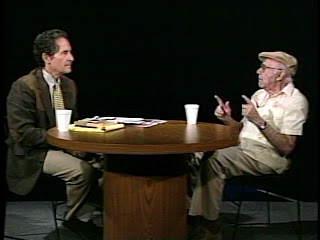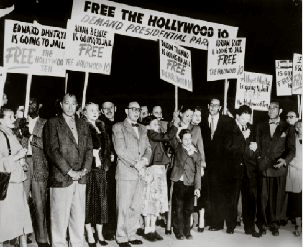
Author Stanley Dyrector
Stanley Dyrector was made for Hollywood... or Hollywood was made for Stanley Dyrector. The verdict is still out. But the former actor, turned writer and award winning talk show host, has been a part of Tinseltown's narrative as much as he has chronicled it. He's acted in many of the classic TV shows of the '60s-'90s alongside Lee Marvin and Connie Stevens before a chance writing stint on Wagon Train ended an itinerant and unpredictable acting career and put him permanently in front of a type writer. Thankfully he hasn't left that seat.
In his latest book, Shedding Light on the Hollywood Blacklist: Conversations With Participants, Dyrector lays bare one of America's most damaging periods for entertainment industry professionals, when screenwriters, playwrights, actors, directors, musicians, and other artists were denied employment because of their suspected "un-American" political beliefs or associations.
Shedding Light consists of several compelling first-person accounts Dyrector recorded with one-time blacklisted screenwriters and actors/director, Jeff Corey, Abraham Polonsky, Norma Barzman, John Randolph, Joan Scott, Jean Rouverol (Butler) and Marsha Hunt, to name a few. The book's foreword was written by actor and longtime activist Ed Asner.
But first let's talk about Mr. Dyrector (even his name has some swagger to it). A former Golden Gloves boxer from the Brownsville section of Brooklyn, New York, Dyrector first came to San Diego, California a sailor- an "airedale" on an aircraft carrier -- but there wasn't any doubt where he wanted to go when he got out of the Navy.
"I had come to Hollywood to become a movie star," said Dyrector in the same straight-up Brooklynese he's never shed after years of living in Los Angeles.
"I was cast in my first movie, called Dragstrip Riot, with Connie Stevens, doing comedy and impersonations. Then came a co-starring role on a TV episode of MSquad starring Lee Marvin, where I played the juvenile delinquent character named Jimmy. I got cast as Native American Indian in Buckskin and Sugarfoot, tested for The Diary of Anne Frank movie before director George Stevens and his son George Junior at Fox, and Dennis Hopper and I were at the same agency. I was a real up-and-comer."
But Dyrector had designs on a life far away from the camera and soon took to writing.
"A little voice inside my head said, 'You should try writing,' and that's what I did," Dyrector told us. "My first television writing credit, an episode of [television series] Wagon Train titled the Katy Piper Story. That got me out of driving a taxi and got me into the Writers Guild of America, West."
For decades, he wrote for radio and television with his wife Joyce, including a stage play A Pelican of the Wilderness in 1973, which venerable critic John Mahoney of the Los Angeles Times called "Outstanding."
It wasn't until having his own popular cable program, The Stanley Dyrector Show, and a chance encounter with his wife's colleague at the Writer's Guild that it occurred to him to write a book about a period Hollywood would just as soon forget about.

Interviewing the late actor John Randolph
"My wife was on the Women's Committee of the Writers Guild of America, West with Norma Barzman -- a blacklisted writer who wrote a book called The Red and the Blacklist. She was married to Ben Barzman, who wrote [the motion picture] El Cid and many other movies," said Dyrector.
"It was because of my wife Joyce was befriended by Norma (I started going to those meetings) that we got to meet other people that were once blacklisted. I remember thinking, 'a lot of blacklisted people are dying, so I'm going to try and get as many as I can on my show, not to mention old Hollywood people.' I had no idea I was going to publish the transcripts one day."
The Hollywood Blacklist
In 1947, the House Un-American Activities Committee, or HUAC, zeroed in on Hollywood's intelligentsia, especially those suspected of having communist sympathies. The first victims were the infamous "Hollywood 10."

Demonstration following the convictions of the Hollywood 10.
The famed 10 were motion-picture producers, directors, and screenwriters Alvah Bessie, Herbert Biberman, Lester Cole, Edward Dmytryk, Ring Lardner Jr., John Howard Lawson, Albert Maltz, Samuel Ornitz, Adrian Schott, and Dalton Trumbo. All were called to Washington to appear before the committee in October, 1947 and each refused to answer questions regarding their possible Communist affiliations; some went to prison, and all were blacklisted -- denied employment by the studios, no matter their talent and reputation.
Senator Joseph McCarthy spearheaded HUAC's next wave of witch hunts ruining the lives of countless other artists who had either once been members or had been sympathetic to the American Communist Party, or had "un-American" political beliefs. Soon a climate of paranoia enveloped what is now known as the "McCarthy period"; betrayal became the flavor of the day and many victims' fates were sealed by friends and colleagues who willingly offered up names to the government. As a result, the careers and lives of beloved individuals were forever ruined. Some even committed suicide, like Broadway, film and television actor Philip Loeb who responded to his being blacklisted by taking an overdose of sleeping pills at a hotel in New York City in 1955.
Then there were decent, otherwise honorable people who buckled under HUAC's unsavory intimidation tactics, who turned on close friends. The most infamous case was that of legendary stage and film director Elia Kazan who appeared as a "friendly witness" before HUAC and gave them the names of 8 Group Theater members he knew to be communists in the 1930s. Kazan's decision to name names made him a controversial figure until his dying day.
"You must know the reasons why they became communists," said Dyrector.
"In the '30s and the beginning of the '40s, the Communist Party was for equal rights for women, minorities having their say and being part of society, and the Communists were pro-people. But the Guild and all other unions were chickenshit and they didn't stand up for the writers and left everybody flat. Only years later there was a big apology."
The words "black list," these days, carry an entirely different meaning for entertainment industry types. Since 2004, studio and production company executives take a survey naming their favorite unproduced scripts and the results (known as The Black List) are posted on a website each December -- and a number of them have now been slated for production. To end up on that list is like winning the lottery.
To read more articles like this go to www.web2carz.com
